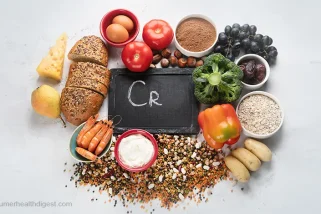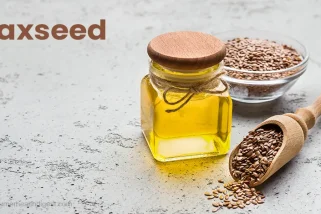In This Article
Even if you’ve never heard of Selenium, you need to know that it’s an essential component for your health. It’s only required in small amounts, yet it’s essential for several bodily functions, including metabolism and thyroid function. Selenium is an important mineral, which means you must get it through your diet.

What is Selenium?
Selenium is a mineral that occurs naturally in soil, water, and food. Because it is a trace mineral, the body only requires a minimal amount of it.
It can be found in foods or as a supplement. Selenium is a component of selenoproteins, which are enzymes and proteins that help create DNA and protect cells from damage and viruses. These proteins are also involved in reproduction and thyroid hormone metabolism. [1]
It also aids in the prevention of oxidative damage and infections in the body. Selenium can be found in dietary supplements. [2]
Although the highest concentration of Selenium is held in the thyroid gland due to numerous selenoproteins that aid thyroid function, the body stores about 28 percent to 46 percent of Selenium in the skeletal muscle.
The majority of Selenium is stored in the form of selenomethionine in human and animal tissues.
Where Does It Come From?
Selenium is found in a variety of foods; however, the amount varies depending on soil location and conditions. The average daily intake of Selenium in the United States is estimated to be 125 micrograms.
People in the Coastal Plain and the Pacific North West, on the other hand, ingest an average of 60 to 90 micrograms of Selenium per day, which is considered adequate.
What Foods Have Selenium?
Plant foods absorb Selenium from the soil, affecting the quantity of Selenium in the animals that eat them. Selenium can be found in a variety of animal protein meals and has several selenium food benefits. [3]
Foods with high selenium levels include seafood, organ meats, and Brazil nuts, while Americans get most of their Selenium from daily foods such as bread, cereals, chicken, red meat, fish, and eggs. [4]
Whole grains, fresh and saltwater fish (tuna and red herring), seeds, brown rice, milk, garlic, steak, poultry, walnuts, and Brazil nuts are all-natural sources of Selenium foods. Because whole foods may be altered after processing, they are the most acceptable sources of Selenium. [5]
What are the benefits of Selenium?
Selenium has several possible health benefits, which include:

Selenium Health Benefits
1. Antioxidant Protection
Selenium is required for the normal function of glutathione peroxidases (GPO) enzymes, which aid in detoxification and defend against oxidative stress.
Chronic illnesses like heart disease, Alzheimer’s, cancer, accelerated aging, and stroke risk have all been related to oxidative stress.
Selenium is also necessary for the recycling of vitamin C.
2. Supports Thyroid Function
Selenium is necessary for the thyroid gland to operate properly. Thyroid tissue has the highest concentration of Selenium than any organ in the body.
Thyroid diseases, including Hashimoto’s thyroiditis, a type of hypothyroidism in which the immune system assaults the thyroid gland, have been linked to selenium deficiency.
Selenium supplements may also help people with Hashimoto’s disease, according to some research. However, further research is needed before selenium supplements for patients with Hashimoto’s disease can be recommended.
3. Prevents Cancer
Selenium may aid in the prevention of some cancers.
Selenium is considered to aid in the prevention of prostate, skin, bladder, lung, and colorectal cancers due to its antioxidant properties and participation in DNA repair, endocrine, and immunological systems.
Oral selenium supplements, for example, were found to improve the overall quality of life and minimize radiation-induced diarrhea in women with cervical and uterine cancer in one study.
4. Cardiovascular Disease
Low selenium levels have been linked to an increased risk of heart disease; therefore, a food rich in Selenium may help keep your heart healthy.
Selenium is vital in preventing oxidative lipid modification and platelet aggregation, both of which can lead to cardiovascular disease.
5. Boosts Immune System
By identifying and combating possible dangers, your immune system maintains your body healthy.
Selenium is necessary for the proper functioning of your immune system. This antioxidant helps your body reduce oxidative stress, which reduces inflammation and boosts immunity.
Other benefits of selenium include
- Improved fertility,
- Boosted brain function,
- Eases symptoms of arthritis,
- Reduce asthma symptoms,
- Prevent mental decline, and
- May help in the removal of dandruff.
Potential Side Effects of Selenium
When Selenium is ingested in normal doses, no known side effects have been reported. Overdosing, on the other hand, can cause heart, renal, and liver problems.
Weakened fingernails, itchy skin, diarrhea, exhaustion, irritability, hair loss, nausea, vomiting, fever, and poor breath are all other possible side effects of Selenium overdose.
It’s crucial to remember that Selenium can be lethal if consumed in extremely large doses.
Recommended Doses and Timing for Selenium
The amount of Selenium to take and when to take it depends on your age, gender, and overall health.
RDA: The following are the recommended dietary allowance per day [6]
- 20 micrograms for children between 1 – 3 years
- 30 micrograms for children between 4 – 8 years
- 40 micrograms for children between 9 – 13 years
- 55 micrograms for teenagers and adults between 14+
- 60 micrograms for pregnant women
- 70 micrograms for breastfeeding women
UL: The Tolerable Upper Intake Level (UL) for Selenium is 400 micrograms per day for all individuals 19 and older, as well as pregnant and breastfeeding women. A UL is the highest daily intake, unlikely to cause health problems. [7]
Higher doses of Selenium can, however, be used to treat certain disorders. Prostate cancer can be prevented by taking 200 milligrams of Selenium every day, according to studies.
Uses of Selenium in Supplements
What Are the Uses of Selenium? Many multivitamins and nutritional supplements contain Selenium. The federal government’s 2010 Dietary Guideline for Americans, on the other hand, states that foods should be the primary source of all nutrients. Even though food is abundant in nutrients and dietary fiber, not everyone gets access to them all.
As a result, a dietary supplement might be beneficial when a person needs to boost their consumption of a certain mineral, such as Selenium, or vitamins. Always look at the label of a dietary supplement to see how much Selenium is in it.
Selenium Interactions
Some drugs might cause your body’s Selenium levels to drop. Selenium, on the other hand, may interact with some prescription medicines and supplements. Antacids, niacin, corticosteroids, birth control pills, chemotherapeutic treatments, and the best cholesterol lowering medications are some of the drugs. [8]
As a result, it’s crucial to talk to a doctor about your Selenium levels before taking supplements containing this mineral.
Frequently Asked Questions
Q: How Much Selenium Should I Take?
A: If you’re a 19-year-old or older adult, the recommended selenium dosage is 55 micrograms. The recommended doses for pregnant or breastfeeding women are 60 and 70 micrograms, respectively. [9]
Q: What is Selenium Good for?
A: Selenium is beneficial to reproduction, thyroid gland function, DNA creation, as well as protecting the body from free radical damage and infection.
Q: Does Selenium Cause Weight Gain?
A: In a nutshell, no. It’s the polar opposite. Getting the required amount of Selenium in your diet will help your thyroid work properly, which will increase your metabolic rate.
Q: What Does Selenium Do for the Body?
A: Selenium supplements are used to prevent or treat selenium deficiency. Selenium is required for normal growth and health.
Final Verdict
Selenium is a vital mineral that helps the body’s cells work normally. It’s just needed in trace amounts and can be found in most everyday foods.
Although this Selenium supplement can help you avoid various health issues, you should stick to the recommended doses because an overdose can bring serious side effects or even death.
Was this article helpful?
9 Sources
We review published medical research in respected scientific journals to arrive at our conclusions about a product or health topic. This ensures the highest standard of scientific accuracy.
[1] Selenium: https://lpi.oregonstate.edu/mic/minerals/selenium#introduction[2] Tinggi U. Selenium: its role as antioxidant in human health. Environ Health Prev Med. 2008;13(2):102-108. doi:10.1007/s12199-007-0019-4
[3] Rayman, M. (2008). Food-chain selenium and human health: Emphasis on intake. British Journal of Nutrition, 100(2), 254-268. doi:10.1017/S0007114508939830
[4] Hariharan S, Dharmaraj S. Selenium and selenoproteins: it's role in regulation of inflammation. Inflammopharmacology. 2020;28(3):667-695. doi:10.1007/s10787-020-00690-x
[5] Selenium: hhttps://ods.od.nih.gov/factsheets/Selenium-HealthProfessional/#h3
[6] How much selenium do I need?: https://ods.od.nih.gov/factsheets/Selenium-Consumer/#h2
[7] Selenium: https://www.hsph.harvard.edu/nutritionsource/selenium/
[8] Selenium: https://ods.od.nih.gov/factsheets/Selenium-Consumer/#h9
[9] The Recommended Dietary Allowance (RDA): https://lpi.oregonstate.edu/mic/minerals/selenium#RDA







 This article changed my life!
This article changed my life! This article was informative.
This article was informative. I have a medical question.
I have a medical question.
 This article contains incorrect information.
This article contains incorrect information. This article doesn’t have the information I’m looking for.
This article doesn’t have the information I’m looking for.